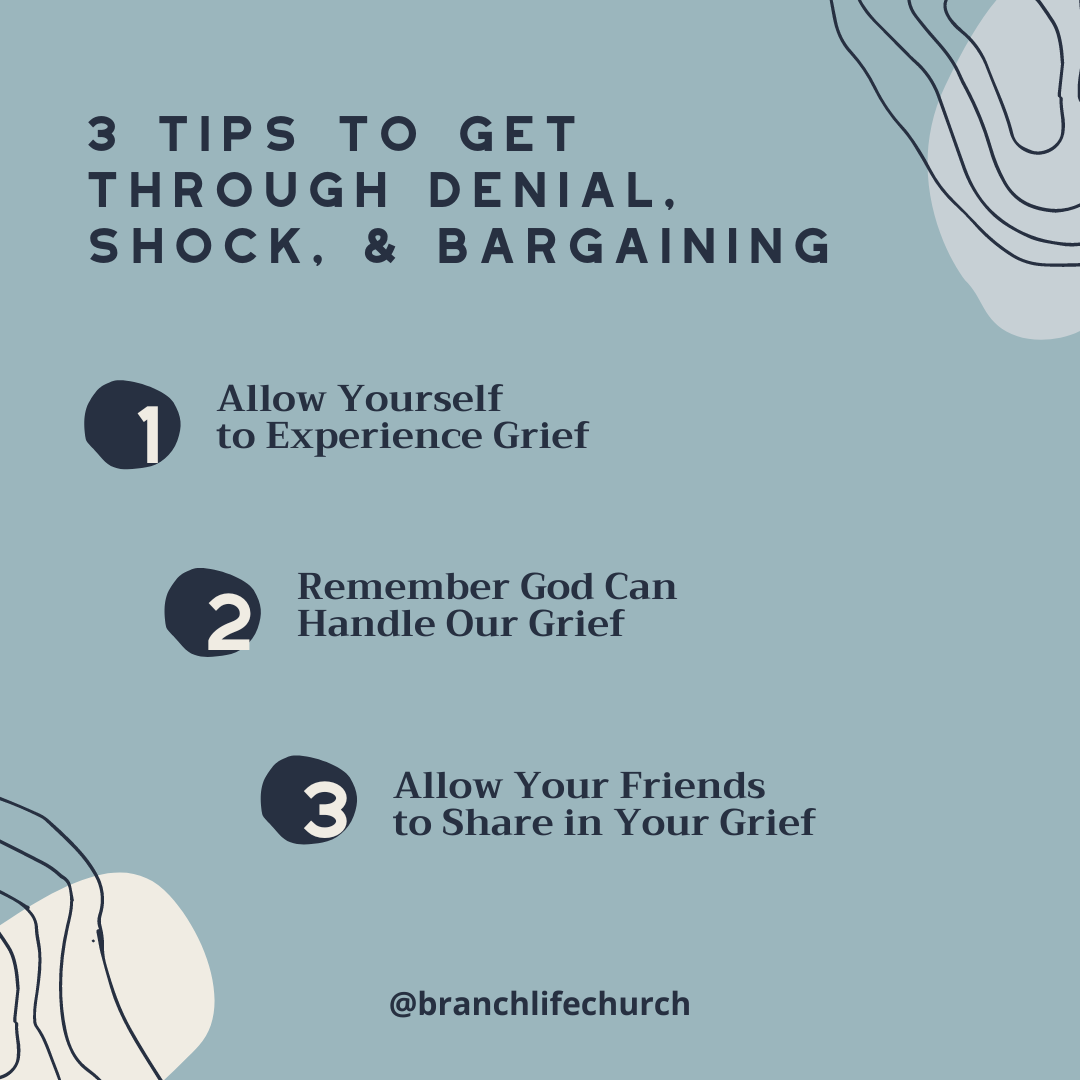Hope In Grief
Is there hope within our grief? In this blog post, we walk through how to experience, express, and choose to allow grief to make us better, not bitter.
This is part 2 in a series on Good Grief. Read part 1 here.
Grief is an acute pain accompanying a loss. Though we all experience grief for different reasons and process it in our own way, grief is typically expressed through these five stages:
1. Denial & shock
2. Bargaining
3. Anger
4. Depression
5. Acceptance
Grief, however, is non-linear. It’s often described as a wave that comes in, goes back out, then crashes back on you again. How can you swim through this grief without drowning? It helps to understand each stage of grief, so you are able to recognize where you’re at as you experience these natural responses.
In the rest of this post, we’ll focus on the first two stages: denial & shock, and bargaining. Then, we’ll provide practical tips about grieving with hope.

Denial & Shock
The denial and shock stage is when we can’t comprehend the reality of our loss.
The Old Testament book of Job is a great example of what happens when we are in shock. In Chapter 1, Job lost his property and children. In Chapter 2, he lost his health. He lost everything and was in terrific emotional and physical pain. In response to this pain, he sat for seven days on the ashes of his property in clear, quiet shock.
Then his friends arrived.
“And they sat with him on the ground seven days and seven nights, and no one spoke a word to him, for they saw that his suffering was very great.”
– Job 2:13 ESV
When Job’s friends saw the pain that he had, they didn’t try to give him platitudes or words. They simply showed up and sat with him in his state of shock.
For a certain period of time, it’s normal to be in denial and even act like the loss hasn’t happened. When you’re in shock, allow yourself to experience it. Don’t circumvent it or cut it short, unless it’s lasting months or years – then seek help from a professional. But if you’re experiencing a lot of pain, your equilibrium is off. Allow yourself to sit there and be in shock. It’s an important part of processing grief.

Bargaining
Bargaining is all about negotiating, bartering, or otherwise trying to find something to take the pain away. It often includes the phrase “if only…
”If only we had a different doctor.”
“If only you didn’t drive down that road.”
“If only I didn’t say that one word.”
This is all bargaining. But this is another normal part of the grieving process.
In the New Testament book of John, chapter 11 begins with the news of Lazarus, a close friend of Jesus, falling seriously ill. By the time Jesus arrives, Lazarus has passed away. Martha and Mary, Lazarus’ sisters, bargain with Jesus.
“Martha said to Jesus, ‘Lord, if you had been here, my brother would not have died…’”
– John 11:21 ESV“
Now when Mary came to where Jesus was and saw him, she fell at his feet, saying to him, ‘Lord, if you had been here, my brother would not have died.’”
– John 11:32 ESV
This leads us to the shortest verse in the Bible: “Jesus wept.”
Jesus empathized with Martha and Mary’s bargaining and grieved Lazarus himself. In the end, Jesus raised Lazarus from the grave, but first, Martha and Mary experienced grief, bargaining, and even acceptance.
This is a normal, biblical experience. So, what can we learn from the Bible about getting through these stages of grief?
3 Tips to Get Through Denial, Shock, & Bargaining
#1. Allow Yourself to Experience Grief
Grief is a natural part of the human experience and healthy relationships. Denial, shock, and bargaining are all normal responses to loss. It is good to experience these things and to swim through the stages of grief towards acceptance.
However, you don’t have to go through these stages alone. Sometimes, we need a friend or friend. Other times we need a therapist, doctor, or both. All the time, we need the hope, faith, and love that’s best found through Jesus.
#2. Remember, God Can Handle Our Grief
Jesus wept. Jesus knows our grief because he’s felt grief Himself.
“And about the ninth hour Jesus cried out with a loud voice, saying, ‘Eli, Eli, lema sabachthani?’ that is, ‘My God, my God, why have you forsaken me?’”
– Matthew 27:46 ESV
God felt grief as his only Son died on the cross. At the same time, Jesus felt the pain of the loss of that relationship with God as he also felt the weight of sin. God knows our grief, which means he can handle it.
The psalmist David knew this. In Psalm 77, he cried out to God in distress. By the end, he found comfort in God. We have a God who is able to hold us and help us through the darkest times in our life.
“In the day of my trouble I seek the Lord; in the night my hand is stretched out without wearying; my soul refuses to be comforted.”
– Psalm 77:2 ESV
God is big enough and powerful and compassionate enough to handle our grief and all the emotions grief comes with. Allow God to be a refuge and a very present help in times of trouble.
#3. Allow Your Friends to Share in Your Grief
Finally, don’t isolate yourself, which is a very big temptation in the denial or shock phase of grief. Allow your friends to share in your grief just like Job’s friends shared in his.
Heartache and pain is often a doorway to intimacy with yourself, others, and God. God can turn around and use your grief for the betterment of others.

Final Thoughts on Grief & Hope
Grief is never easy, but it’s also never hopeless. When you allow yourself to experience it and express it, you will be able to choose to allow it to make you better, not bitter. We hope these tips help you experience these stages of grief in a healthy way.
Remember: You’re not alone. All the time, you can find hope, love, and joy through Jesus.
If there's anything that we can do to support you in your journey and in this chapter of life, please don't hesitate to reach out. You’re not in this alone!

